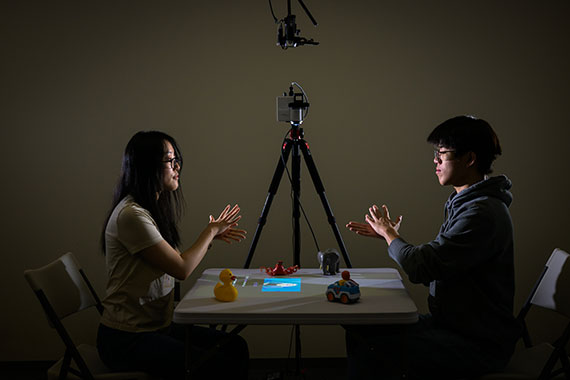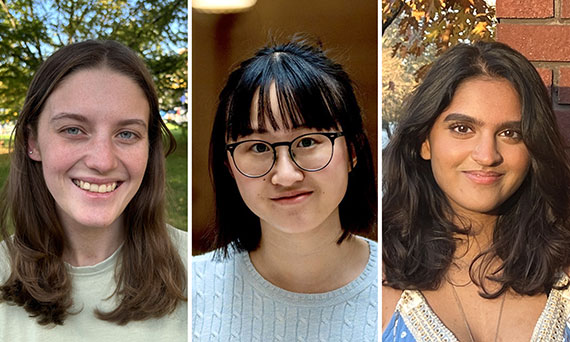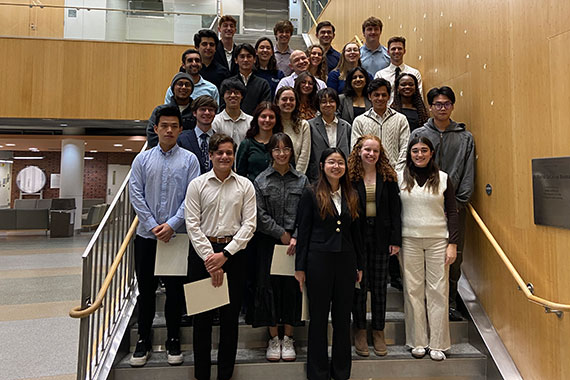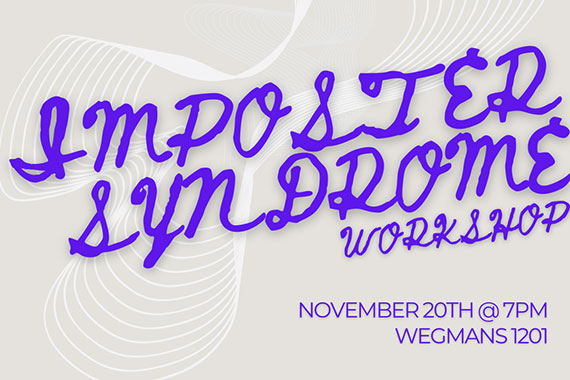November 18, 2024

University of Rochester photo / J. Adam Fenster
Dear members of the Hajim School community,
Can artificial intelligence-powered tools help enrich child development and learning?
That question is the crux of a series of research projects led by Zhen Bai, an assistant professor of computer science and the Biggar Family Fellow in Data Science at the Goergen Institute for Data Science. From tools to help parents of deaf and hard-of-hearing (DHH) children learn American Sign Language (ASL) to interactive games that demystify machine learning, Bai aims to help children benefit from AI and understand how it is impacting them.
Bai, an expert in human-computer interaction, believes that, despite all the concern and angst about AI, the technology has tremendous potential for good. She believes children are especially primed to benefit.
“Over the years, I’ve seen how kids get interested whenever we present technology like a conversational agent,” says Bai. “I feel like it would be a missed opportunity if we don’t prepare the next generation to know more about AI so they can feel empowered in using the technology and are informed about the ethical issues surrounding it.”
Read about Zhen’s research at the News Center and watch a video about her project to help parents of DHH children learn ASL.
WELLS PRIZE WINNERS EXCEL IN ENGINEERING AND BEYOND

Each year, the Hajim School honors three seniors who are majoring in an engineering discipline while pursuing a major or minor in one of the humanities fields with the Robert L. Wells Prize. The recipients are those with the highest grade point averages at the end of their junior year.
Named for Robert Wells ’39, who felt strongly that an engineer needed the balance of the humanities, the award celebrates the unexpected connections and synergies that emerge across disciplines.
This year’s Wells Prize recipients are:
Read more about each recipient at the News Center.
TAU BETA PI

Rochester’s chapter of the Tau Beta Pi Engineering Honor Society recently initiated 30 new members. Throughout the academic year, our chapter hosts a variety of activities including community service, social events, corporate information sessions, and study sessions to help other engineering students succeed.
This year’s new inductees include Kaan Aytekin, ME, ’26; Julesy Baker, CHE, ’25; Cady Brunecz, ME, ’25; Saumili Chakravarty, ECE, ’26; Arthur Chen, CHE, ’26; Zajans Crapo, ME, ’25; Leo Critchfield, ME, ’25; Hesham Elshafey, ECE, ’25; Hailey Epstein, ME, ’26; Christina Falasco, ECE, ’26; Nyasha Gwaza, ECE, ’26; Sufi Hossain, ECE, ’26; Benjamin Kamenetsky, BME, ’26; Kade Kaufmann, BME, ’26; Madison King, ECE, ’25; Szymon Kuzniar, CHE, ’25; Alex Lee, ME, ’26; Kyra McCracken, BME, ’26; Joey Meltzer, ME, ’26; Manuela Montes de Oca, BME, ’25; Bridgit Nguyen, ME, ’26; Newt Perlman, ECE, ’26; Alejandro Porras Díaz, ME, ’25; Natalie Shank, ME, ’26; Yicheng Shi, ECE, ’25; Martin Trpceski, ECE, ’26; Victoria Usachev, OPE, ’25; Cecelia Vassallo, ME, ’26; Tengqian Wang, OPE, ’25; and ZhouZhi Xia, OPE, ’25.
Congratulations to all!
WIC-MIC TO CO-HOST IMPOSTER SYNDROME WORKSHOP

Join Women and Minorities in Computing (WiC-MiC) at 7 p.m. on Wednesday, November 20 in the Data Science Suite (1201 Wegmans Hall) for the Imposter Syndrome Workshop in collaboration with the Medallion Program.
The workshop will address the feelings of self-doubt and inadequacy that many people experience, especially in academic and professional settings. Whether you’ve experienced imposter syndrome yourself or want to learn how to support others, this session will provide valuable insights and practical strategies.
EDUCATIONAL IT INNOVATION GRANTS FOR 2025
The Educational IT Committee, a part of the University of Rochester IT Governance structure, promotes the use of technologies to support instructional innovation throughout the University of Rochester. By encouraging and supporting faculty and staff efforts in this area, they hope to enhance learner experiences and outcomes. They also seek to maximize the potential impact of educational IT innovations through projects that offer broad applicability across multiple schools.
To support these aims, they have announced an Innovation Grant program in which funding will be available through a proposal process to support faculty and staff in adopting new technologies in their teaching. This program will also include mentorship, support, and connection to existing resources in the institution through the committee. Go to the Online Learning website for more information.
NEW SPACE PLANNING WEB PORTAL FOR FACULTY AND STAFF
The space planning team recently launched a new Space Planning Web Portal, designed to simplify and streamline your interactions with the team. This centralized platform allows faculty and staff in the Hajim School to submit a variety of space-related requests—from additional space needs and renovation projects to furniture requests.
The portal offers a transparent, organized approach to managing space resources, making it easier for you to track the progress of your requests, view key milestones, and receive updates every step of the way. Each form is tailored to capture all essential details, ensuring that requests are processed efficiently and effectively. The intent of the portal is to enhance collaboration, reduce response times, and empower you to better utilize the university’s space resources. Enter the portal.
BLACKBOARD ULTRA 1:1 SESSIONS FOR FACULTY
Hajim faculty members—are you thinking about your spring course and unsure how to move to Ultra? While workshops are informative, you might want to sit down and talk about your course specifically. Zoom and in-person sessions held in Rush Rhees Library are available for instructors to meet with the instructional design/technology team. Schedule a meeting with Teaching & Learning Services.
Have a great week!
Your dean,
Wendi Heinzelman